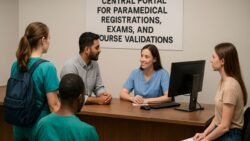Allied Health Courses – The Paramedical Council plays a pivotal role in shaping the future of healthcare by ensuring standardized education and maintaining transparency in allied health professions. As healthcare continues to evolve, the demand for skilled paramedical professionals is rapidly increasing. To meet this need, the Council works to regulate curriculum, accredit institutions, and oversee examinations that align with national healthcare priorities. This ensures that students graduating from recognized institutions are well-trained, competent, and equipped with practical knowledge. Transparency is equally critical in this process, as it builds trust among students, educators, and healthcare providers. By upholding ethical standards and fostering accountability, the Paramedical Council ensures that allied health workers contribute meaningfully to improving patient care. With a strong emphasis on quality, the Council also collaborates with government agencies and health organizations to introduce reforms and adopt global best practices. This commitment makes it a cornerstone of India’s healthcare education system, particularly for those pursuing careers in paramedical sciences.

Standardization of Paramedical Education Across India
Education in the allied health sector requires consistency to maintain quality across states and institutions. The Paramedical Council addresses this by introducing standardized curricula, training modules, and evaluation systems that align with global frameworks such as those outlined by the World Health Organization. This prevents disparities in training, ensuring that students in rural colleges receive the same level of academic rigor as those in metropolitan institutes. Standardization also reduces confusion among students and employers by providing a uniform benchmark for qualifications. Moreover, it ensures that graduates have the necessary clinical and technical skills to support doctors, nurses, and healthcare systems effectively. The Paramedical Council conducts periodic reviews of teaching methodologies and infrastructure, urging institutions to incorporate simulation labs, modern diagnostic equipment, and hands-on internships. Such reforms not only improve academic outcomes but also empower students to meet the challenges of real-world healthcare environments confidently.
Transparency and Accountability in Allied Health Training
Transparency is a cornerstone of the Paramedical Council’s mission, as it ensures fair and reliable practices in admissions, examinations, and certifications. By implementing strict guidelines and monitoring mechanisms, the Council safeguards students against fraudulent institutions and misleading claims. For example, only accredited institutes listed by government-approved councils can admit students, reducing the prevalence of unrecognized programs. The emphasis on transparency extends to examinations, where standardized assessments ensure equal opportunities for all students. Furthermore, digitized processes and record-keeping have made it easier to track student progress, verify certificates, and prevent malpractice. Transparency also fosters accountability among institutions, compelling them to maintain quality faculty, adequate facilities, and ethical admission procedures. Such measures not only protect students but also enhance the credibility of the paramedical profession in India. As highlighted by research on healthcare workforce development, accountability mechanisms are essential to ensure sustainability and long-term trust in healthcare systems.
Role of Paramedical Council in Bridging Skill Gaps
The healthcare industry often faces shortages of skilled allied health professionals, particularly in rural and underserved regions. The Paramedical Council helps bridge this gap by ensuring institutions produce graduates who are ready to meet diverse healthcare needs. By mandating internships, practical training, and exposure to community health programs, the Council emphasizes experiential learning alongside theoretical knowledge. This approach helps students gain confidence in handling medical technologies, diagnostic tools, and patient care responsibilities. Skill development initiatives, often supported by government and international collaborations, aim to train students in areas such as laboratory sciences, radiology, physiotherapy, and emergency response. As noted by healthcare workforce studies, the role of paramedical professionals became particularly evident during global crises like the COVID-19 pandemic, where their contribution was critical in diagnostics and patient support. Thus, the Council’s focus on skill enhancement directly contributes to strengthening India’s healthcare infrastructure.
 National Paramedical Council for Student Registration, Institute Recognition, and Compliance
National Paramedical Council for Student Registration, Institute Recognition, and Compliance
Global Relevance and Future of Allied Health Regulation
As India integrates further into the global healthcare community, the Paramedical Council’s work gains international significance. With medical tourism on the rise and Indian paramedical professionals seeking opportunities abroad, aligning education standards with global benchmarks is essential. The Council’s efforts to incorporate international best practices not only improve domestic healthcare quality but also enhance global employability for Indian graduates. Collaboration with organizations such as the UNESCO International Institute for Educational Planning has influenced reforms that emphasize research, innovation, and cross-border recognition of qualifications. Looking ahead, the Council is expected to adopt digital learning tools, AI-driven healthcare training, and more transparent accreditation systems. This will enable future-ready professionals who can adapt to technological advancements and evolving healthcare demands. Ultimately, by ensuring standardized education and transparency, the Paramedical Council safeguards public health while preparing students to thrive in both domestic and international allied health sectors.






